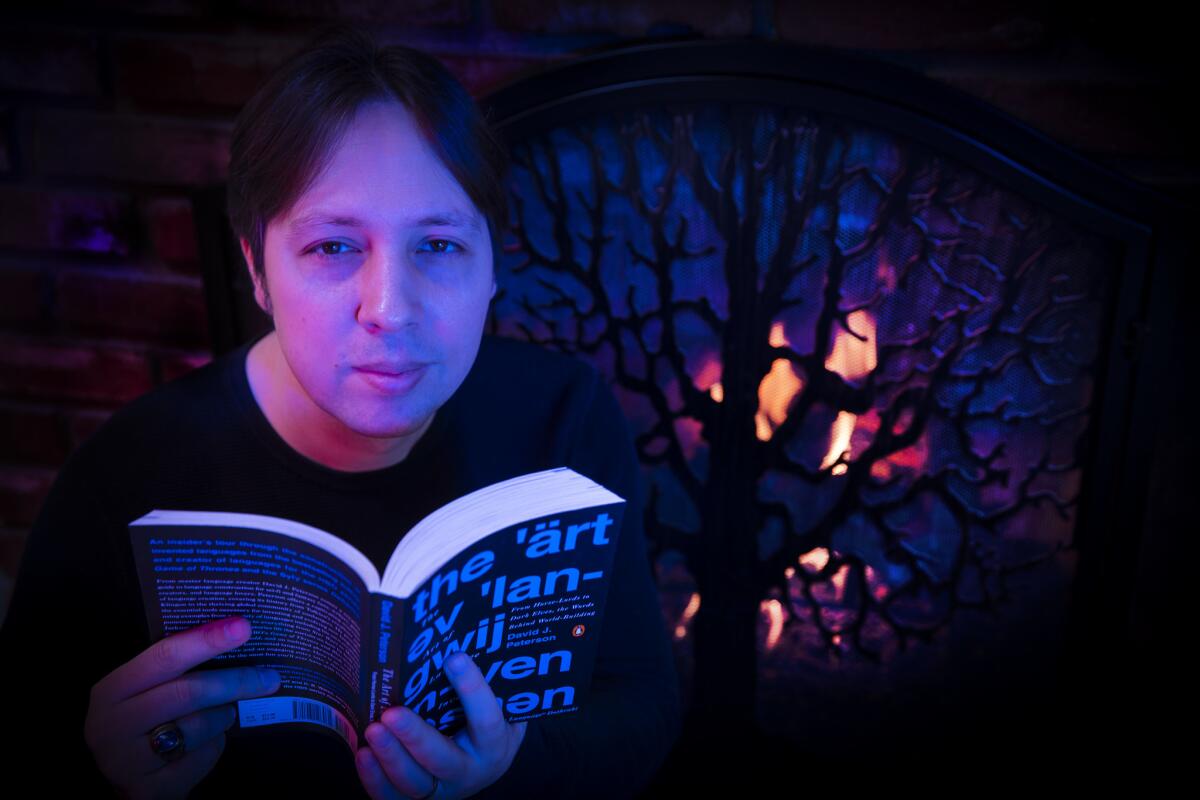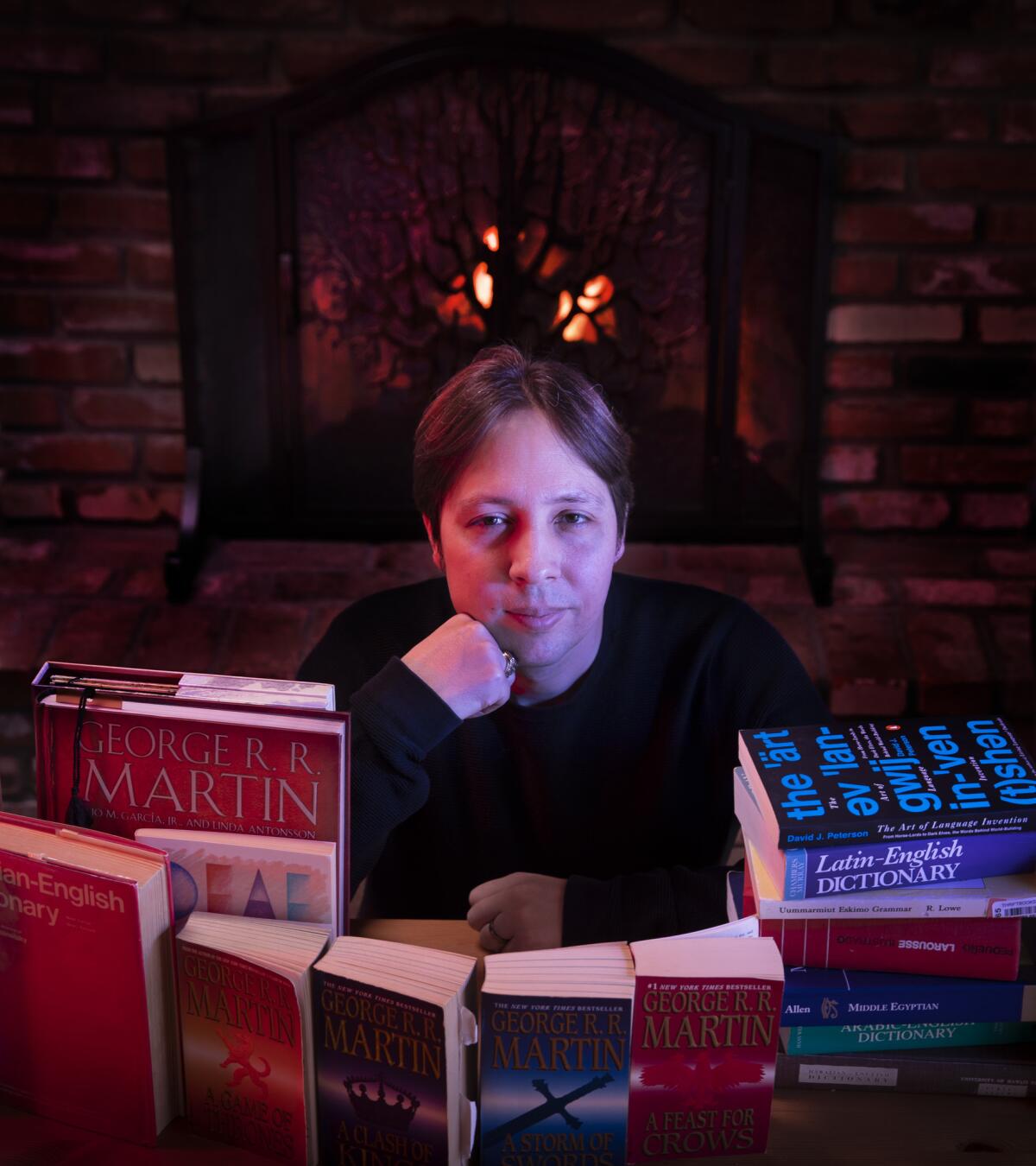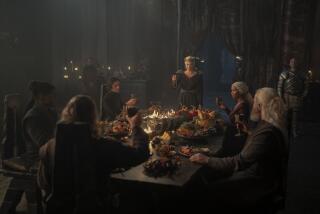How ‘Game of Thrones’ linguist David J. Peterson became Hollywood’s go-to language guy

- Share via
When David J. Peterson was an undergraduate student at UC Berkeley, he saw a flier advertising an Esperanto class. It was the first time he’d heard of such a thing as an invented language, but it wouldn’t be the last.
Peterson became a linguist and author — and an inventor of languages. It’s a job that’s led him to a career in Hollywood. He’s created languages for elves and orcs in the Netflix film “Bright” as well as a language called Shivaisith for “Thor: The Dark World” and Nelvayu for “Doctor Strange.” But the languages that made him famous outside of linguist circles were the ones he created for “Game of Thrones,” especially Dothraki and High Valyrian.
In 2009, two years before the series premiered on HBO, the show’s producers were looking for someone to come up with a language for the Dothraki people, the nomadic clan of horse-riding warriors whose king, Khal Drogo, figured prominently in the narrative of George R.R. Martin’s books.
RELATED: ‘Game of Thrones’ - A brief history of the Dothraki language »
They reached out to the Language Creation Society, a group co-founded by Peterson — by then an enthusiastic “conlanger” or language creator. The decision was made to hold a contest among its members.
He didn’t have to wield an arakh — half sword, half scythe in Dothraki — to win the honor. Instead, Peterson spent the next few weeks putting together 300 pages of material on Dothraki. Another contestant had compiled a list of every single Dothraki word in Martin’s books; Peterson used those words as a starting point, extracting whatever linguistic meaning he could from Martin’s quasi-gibberish.
From there he used the same process he’s used for all the languages he’s constructed.
He starts with the phonology, or sound, then moves on to grammar, starting with nouns, “because they’re simpler.” Verbs, then other parts of speech are next, followed by sentence structure and derivation — “how you start with one word and get another.” Then he builds the vocabulary.
Peterson followed these steps when creating High Valyrian, a mostly dead language comparable to Latin that is spoken by scholars and priests and is first heard in Season 3 of the series. But he had just lonely two phrases from Martin to work with: valar morghulis (“all men must die”) and valar dohaeris “all men must serve.”
Peterson, who lives in Garden Grove, has done his work on “Game of Thrones” from afar, sending MP3 recordings of translated dialogue for the actors to use as reference. As security on the show became more intense, he stopped getting scripts and would just get the individual lines he needed via a web service. Sometimes he’d ask for additional context. But, he says, “I wouldn’t be surprised if they sent me red herrings just for security.”
FULL COVERAGE: The final season of ‘Game of Thrones’ »
He also occasionally fields inquiries from Martin, who still has two more books to complete in the “Song of Fire and Ice” book series. Peterson has his own books as well, including a “The Art of Language Invention: From Horse-Lords to Dark Elves, the Words Behind World Building” and a book that teaches readers Dothraki.
Between seasons of “Game of Thrones,” Peterson has worked steadily as a conlanger in Hollywood, creating languages and consulting for the Syfy series “Defiance” (he was the show’s “alien language and culture consultant”), MTV’s “The Shannara Chronicles,” AMC’s “Into the Badlands” and the still-running CW series “The 100.”
These days, it seems, there is a high demand for linguists on TV and film productions.
“I know producers are reading this,” Peterson says. “I came out of a community of language creators, literally thousands, some of whom are much better than me. Many who would love the opportunity. I would give them names at this point.”
How very erin (kind) of him.
See the most-read stories in Entertainment this hour »

Follow me @MeredithBlake
More to Read
The complete guide to home viewing
Get Screen Gab for everything about the TV shows and streaming movies everyone’s talking about.
You may occasionally receive promotional content from the Los Angeles Times.






